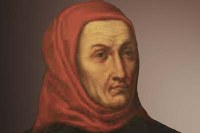The story of Giovanni da Legnano is especially eloquent: arriving in Bologna a foreigner, he was granted citizenship as a university teacher, his diplomatic activity then winning him prominent political positions amidst the delicate, frenetic alternation of domination and independence, agreement and schism that marked the 14th century.
 Born in Legnano in about 1320, Giovanni came to Bologna in 1350, hungry for cultural enrichment. He was probably helped and supported in this move by his fellow Lombards, the Visconti, who had become lords of the city that same year.
Born in Legnano in about 1320, Giovanni came to Bologna in 1350, hungry for cultural enrichment. He was probably helped and supported in this move by his fellow Lombards, the Visconti, who had become lords of the city that same year.
The Milanese jurist did not find a tranquil political and social situation when he arrived, Bologna having just come out of a shaky period under the Pepoli (1337-50) and the devastating wave of the plaque that had carried away a third of the population (1348). The Visconti also found themselves unable to rule as they wished, divided as they were by internal feuds.
In the meantime, Giovanni began to teach canon law (in 1351), write treatises on various subjects and get involved in city politics.
After Giovanni Visconti da Oleggio handed over Bologna, in exchange for Fermo, to the cardinal Egidio d’Albornoz (1360), who became its papal legate, Giovanni entered the new circle of power, dedicating the treatise De Bello to Albornoz and, through his writings, supporting the temporal authority of the Church, at the time still based in Avignon, but already looking to return to Italy.
He forged relationships based on mutual admiration with the new pope Urban V and the emperor Charles IV, who elevated him to the rank of count palatine in 1368.
His fame spread north of the Alps and he came to be universally recognised as an exemplary teacher of law as well as philosopher and expert in the liberal arts.
In the meantime, Bologna rebelled against foreign rule and, once the cardinal legate from Avignon, Guillaume Noellet, was driven out (1375), declared its independence, founding the Signoria of the people and the guilds (1376). In this new independence-focused structure tied to the power of the city’s guilds, Giovanni da Legnano held the balance, sensitive to the needs of the citizens while adhering to the papal political vision. As a consequence, and in spite of not being a cleric, he was appointed papal vicar, first under Gregory XI (1377), and then under Urban VI (1378-1381).
He became the latter’s most distinguished lawyer, looking down from his university bench. He was witness to the beginning of the Great Schism, which saw the Roman Urban VI positioned against the Avignonese Clement VII. The jurist supported the Roman cause through canonical, theological and philosophical treatises, which confirm his status as a great dialectician of the varied culture of the Middle Ages.
In addition to these lively, intellectually combative writings, he also wrote commentaries to the Decretum, the Decretali and the Clementine.
By this point in his sixties, Giovanni abandoned politics and, out of gratitude, decided to will the University of Bologna his prestigious residence (modernised over the centuries and now home to the city courthouse) upon the extinction of his family.
He died in 1383 and was buried in Bologna’s church for jurists: San Domenico.
A fragment of his tomb, perhaps the most moving of those that survive and masterfully carved by Pierpaolo and Jacobello dalle Masegne, can be seen today in the Museo Civico Medievale. Sculpted in the stone, his students listen, eternally absorbed, to the teachings of the renowned jurist.
Giovanni da Legnano was an exemplary representative of the 14th century, so much so that Geoffrey Chaucer cited him alongside Petrarch in his Canterbury Tales (1388): the former as the light that lit up Italy with law, philosophy and the other arts; the latter with his sweet poetry:
Francis Petrarch, the laureate poet,
Was this clerk’s name, whose rhetoric so sweet
llumed all Italy with poetry,
As did Lignano with philosophy,
Or law, or other art particular.
